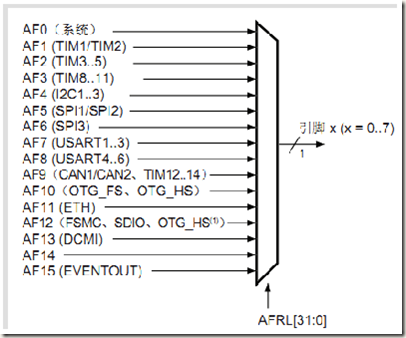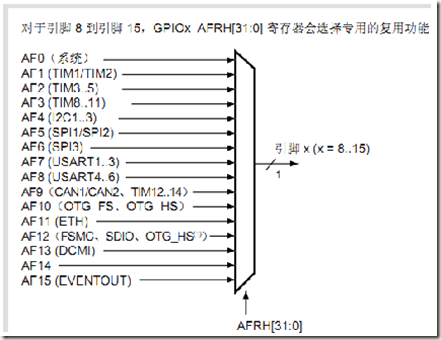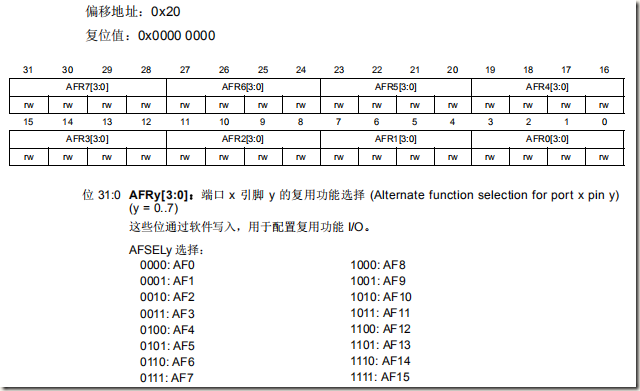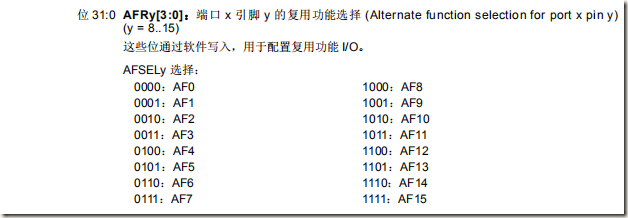关于嵌入式学习随笔->7《IO引脚复用和映射原理》
对于M4/M7来说引脚的复用和映射原理是一模一样的,M3与M4/M7是有区别的。现在主要学习M4/M7。
1、什么是复用,STM32引脚怎么复用?
众所周知,一般对于一个芯片来讲都有很多个引脚,但是,如果这些引脚都做IO口来说,这是十分浪费的。比如我们的项目工程只需要40个IO口,那么其他引脚是不是都会被闲置呢。如果没有复用功能,那么显然会浪费很多引脚。STM32有很多的内置外设,这些外设的外部引脚都是与GPIO复用的。也就是说,一个GPIO如果可以复用为内置外设的功能引脚,那么当这个GPIO作为内置外设使用的时候,就叫复用。
例如串口1的发送接收引脚是PA9、PA10,当我们把PA9、PA10不用做GPIO,而是用作复用功能串口1的发送接收引脚时,就叫做端口复用。一般来说,一个引脚有很多个复用功能,当我们需要一些特殊功能的时候,我们可以到对应芯片的数据手册查找对应的引脚。(STM32F767IGT6引脚复用功能查询)
STN32系列微控制器IO引脚通过一个复用器连接到内置外设或模块。该复用器一次只允许一个外设的复用功能(AF)连接到对应的IO口。这样就可以确保共用同一个IO引脚的外设之间不会发生冲突。每个IO引脚都有一个复用器,该复用器采用16路复用功能输入(AF0到AF15),可通过GPIOx_AFRL(针对引脚0-7)和GPIOx_AFRH(针对引脚8-15)寄存器对这些输入进行配置,没思维控制一路复用。端口复用示意图如下:
2、复用功能寄存器AFRL(低位0-7)
3、复用功能寄存器AFRH(高位8-15)
4、复用功能映射配置
--》系统功能
-->将I/O连接到AF0(系统默认的),然后根据所用功能进行配置:
-->JTAG/SWD:在各器件复位后,会将这些引脚指定为专用引脚,可供片上调试模块立即使用(不受GPIO控制器控制)
-->RTC_REFIN:此引脚应配置为浮空模式。
-->MCO1和MCO2:这些引脚必须配置为复用功能模式。
--》在GPIOx_MODER寄存器中将所需I/O配置为输出或是输入。
--》外设复用功能
-->对于ADC和DAC,在GPIOx_MODER寄存器中将所需I/O配置为模拟通道(DAC与ADC都是)。
-->对于其它外设:
-->在GPIOx_MODER寄存器中将所需I/O配置为复用功能
-->通过GPIOx_OTYPER、GPIOx_PUPDR和GPIOx_OSPEEDER寄存器,分别配置类型、上/下拉及速度。
-->在GPIOx_AFRL或是GPIOx_AFRH寄存器中,将I/O连接到所需AFx。
5、端口复用配置过程
--》首先,GPIO端口时钟使能,所需函数(例如GPIOA时钟使能):
1 __HAL_RCC_GPIOA_CLK_ENABLE(); //使能GPIOA时钟
--》其次,复用外设时钟使能,所需函数(例如串口功能):
1 __HAL_RCC_USART1_CLK_ENABLE(); //使能USART1时钟
--》然后,将端口模式配置为复用功能,所需函数:
1 HAL_GPIO_Init(GPIO_TypeDef *GPIOx, GPIO_InitTypeDef *GPIO_Init)-->其中GPIO_InitTypeDef结构体为:
(Pin为引脚、Mode为输入输出模式、Pull为上/下拉、Speed为速度、Alternate为功能)
1 typedef struct 2 { 3 uint32_t Pin; /*!< Specifies the GPIO pins to be configured. 4 This parameter can be any value of @ref GPIO_pins_define */ 5 6 uint32_t Mode; /*!< Specifies the operating mode for the selected pins. 7 This parameter can be a value of @ref GPIO_mode_define */ 8 9 uint32_t Pull; /*!< Specifies the Pull-up or Pull-Down activation for the selected pins. 10 This parameter can be a value of @ref GPIO_pull_define */ 11 12 uint32_t Speed; /*!< Specifies the speed for the selected pins. 13 This parameter can be a value of @ref GPIO_speed_define */ 14 15 uint32_t Alternate; /*!< Peripheral to be connected to the selected pins. 16 This parameter can be a value of @ref GPIO_Alternate_function_selection */ 17 }GPIO_InitTypeDef;
6、AF(0-15)功能选择
1 /** 2 * @brief AF 0 selection 3 */ 4 #define GPIO_AF0_RTC_50Hz ((uint8_t)0x00U) /* RTC_50Hz Alternate Function mapping */ 5 #define GPIO_AF0_MCO ((uint8_t)0x00U) /* MCO (MCO1 and MCO2) Alternate Function mapping */ 6 #define GPIO_AF0_SWJ ((uint8_t)0x00U) /* SWJ (SWD and JTAG) Alternate Function mapping */ 7 #define GPIO_AF0_TRACE ((uint8_t)0x00U) /* TRACE Alternate Function mapping */ 8 9 /** 10 * @brief AF 1 selection 11 */ 12 #define GPIO_AF1_TIM1 ((uint8_t)0x01U) /* TIM1 Alternate Function mapping */ 13 #define GPIO_AF1_TIM2 ((uint8_t)0x01U) /* TIM2 Alternate Function mapping */ 14 #if defined (STM32F765xx) || defined(STM32F767xx) || defined(STM32F769xx) || defined(STM32F777xx) || defined(STM32F779xx) 15 #define GPIO_AF1_UART5 ((uint8_t)0x01U) /* UART5 Alternate Function mapping */ 16 #define GPIO_AF1_I2C4 ((uint8_t)0x01U) /* I2C4 Alternate Function mapping */ 17 #endif /* STM32F767xx || STM32F769xx || STM32F777xx || STM32F779xx */ 18 19 /** 20 * @brief AF 2 selection 21 */ 22 #define GPIO_AF2_TIM3 ((uint8_t)0x02U) /* TIM3 Alternate Function mapping */ 23 #define GPIO_AF2_TIM4 ((uint8_t)0x02U) /* TIM4 Alternate Function mapping */ 24 #define GPIO_AF2_TIM5 ((uint8_t)0x02U) /* TIM5 Alternate Function mapping */ 25 26 /** 27 * @brief AF 3 selection 28 */ 29 #define GPIO_AF3_TIM8 ((uint8_t)0x03U) /* TIM8 Alternate Function mapping */ 30 #define GPIO_AF3_TIM9 ((uint8_t)0x03U) /* TIM9 Alternate Function mapping */ 31 #define GPIO_AF3_TIM10 ((uint8_t)0x03U) /* TIM10 Alternate Function mapping */ 32 #define GPIO_AF3_TIM11 ((uint8_t)0x03U) /* TIM11 Alternate Function mapping */ 33 #define GPIO_AF3_LPTIM1 ((uint8_t)0x03U) /* LPTIM1 Alternate Function mapping */ 34 #define GPIO_AF3_CEC ((uint8_t)0x03U) /* CEC Alternate Function mapping */ 35 #if defined (STM32F765xx) || defined(STM32F767xx) || defined(STM32F769xx) || defined(STM32F777xx) || defined(STM32F779xx) 36 #define GPIO_AF3_DFSDM1 ((uint8_t)0x03U) /* DFSDM1 Alternate Function mapping */ 37 #endif /* STM32F767xx || STM32F769xx || STM32F777xx || STM32F779xx */ 38 /** 39 * @brief AF 4 selection 40 */ 41 #define GPIO_AF4_I2C1 ((uint8_t)0x04U) /* I2C1 Alternate Function mapping */ 42 #define GPIO_AF4_I2C2 ((uint8_t)0x04U) /* I2C2 Alternate Function mapping */ 43 #define GPIO_AF4_I2C3 ((uint8_t)0x04U) /* I2C3 Alternate Function mapping */ 44 #define GPIO_AF4_I2C4 ((uint8_t)0x04U) /* I2C4 Alternate Function mapping */ 45 #define GPIO_AF4_CEC ((uint8_t)0x04U) /* CEC Alternate Function mapping */ 46 #if defined (STM32F765xx) || defined(STM32F767xx) || defined(STM32F769xx) || defined(STM32F777xx) || defined(STM32F779xx) 47 #define GPIO_AF4_USART1 ((uint8_t)0x04) /* USART1 Alternate Function mapping */ 48 #endif /* STM32F767xx || STM32F769xx || STM32F777xx || STM32F779xx */ 49 50 /** 51 * @brief AF 5 selection 52 */ 53 #define GPIO_AF5_SPI1 ((uint8_t)0x05U) /* SPI1 Alternate Function mapping */ 54 #define GPIO_AF5_SPI2 ((uint8_t)0x05U) /* SPI2/I2S2 Alternate Function mapping */ 55 #define GPIO_AF5_SPI3 ((uint8_t)0x05U) /* SPI3/I2S3 Alternate Function mapping */ 56 #define GPIO_AF5_SPI4 ((uint8_t)0x05U) /* SPI4 Alternate Function mapping */ 57 #define GPIO_AF5_SPI5 ((uint8_t)0x05U) /* SPI5 Alternate Function mapping */ 58 #define GPIO_AF5_SPI6 ((uint8_t)0x05U) /* SPI6 Alternate Function mapping */ 59 60 /** 61 * @brief AF 6 selection 62 */ 63 #define GPIO_AF6_SPI3 ((uint8_t)0x06U) /* SPI3/I2S3 Alternate Function mapping */ 64 #define GPIO_AF6_SAI1 ((uint8_t)0x06U) /* SAI1 Alternate Function mapping */ 65 #if defined (STM32F765xx) || defined(STM32F767xx) || defined(STM32F769xx) || defined(STM32F777xx) || defined(STM32F779xx) 66 #define GPIO_AF6_UART4 ((uint8_t)0x06U) /* UART4 Alternate Function mapping */ 67 #define GPIO_AF6_DFSDM1 ((uint8_t)0x06U) /* DFSDM1 Alternate Function mapping */ 68 #endif /* STM32F767xx || STM32F769xx || STM32F777xx || STM32F779xx */ 69 70 /** 71 * @brief AF 7 selection 72 */ 73 #define GPIO_AF7_USART1 ((uint8_t)0x07U) /* USART1 Alternate Function mapping */ 74 #define GPIO_AF7_USART2 ((uint8_t)0x07U) /* USART2 Alternate Function mapping */ 75 #define GPIO_AF7_USART3 ((uint8_t)0x07U) /* USART3 Alternate Function mapping */ 76 #define GPIO_AF7_UART5 ((uint8_t)0x07U) /* UART5 Alternate Function mapping */ 77 #define GPIO_AF7_SPDIFRX ((uint8_t)0x07U) /* SPDIF-RX Alternate Function mapping */ 78 #define GPIO_AF7_SPI2 ((uint8_t)0x07U) /* SPI2 Alternate Function mapping */ 79 #define GPIO_AF7_SPI3 ((uint8_t)0x07U) /* SPI3 Alternate Function mapping */ 80 #if defined (STM32F765xx) || defined(STM32F767xx) || defined(STM32F769xx) || defined(STM32F777xx) || defined(STM32F779xx) 81 #define GPIO_AF7_SPI6 ((uint8_t)0x07U) /* SPI6 Alternate Function mapping */ 82 #define GPIO_AF7_DFSDM1 ((uint8_t)0x07U) /* DFSDM1 Alternate Function mapping */ 83 #endif /* STM32F767xx || STM32F769xx || STM32F777xx || STM32F779xx */ 84 85 /** 86 * @brief AF 8 selection 87 */ 88 #define GPIO_AF8_UART4 ((uint8_t)0x08U) /* UART4 Alternate Function mapping */ 89 #define GPIO_AF8_UART5 ((uint8_t)0x08U) /* UART5 Alternate Function mapping */ 90 #define GPIO_AF8_USART6 ((uint8_t)0x08U) /* USART6 Alternate Function mapping */ 91 #define GPIO_AF8_UART7 ((uint8_t)0x08U) /* UART7 Alternate Function mapping */ 92 #define GPIO_AF8_UART8 ((uint8_t)0x08U) /* UART8 Alternate Function mapping */ 93 #define GPIO_AF8_SPDIFRX ((uint8_t)0x08U) /* SPIDIF-RX Alternate Function mapping */ 94 #define GPIO_AF8_SAI2 ((uint8_t)0x08U) /* SAI2 Alternate Function mapping */ 95 #if defined (STM32F765xx) || defined(STM32F767xx) || defined(STM32F769xx) || defined(STM32F777xx) || defined(STM32F779xx) 96 #define GPIO_AF8_SPI6 ((uint8_t)0x08U) /* SPI6 Alternate Function mapping */ 97 #endif /* STM32F767xx || STM32F769xx || STM32F777xx || STM32F779xx */ 98 99 100 /** 101 * @brief AF 9 selection 102 */ 103 #define GPIO_AF9_CAN1 ((uint8_t)0x09U) /* CAN1 Alternate Function mapping */ 104 #define GPIO_AF9_CAN2 ((uint8_t)0x09U) /* CAN2 Alternate Function mapping */ 105 #define GPIO_AF9_TIM12 ((uint8_t)0x09U) /* TIM12 Alternate Function mapping */ 106 #define GPIO_AF9_TIM13 ((uint8_t)0x09U) /* TIM13 Alternate Function mapping */ 107 #define GPIO_AF9_TIM14 ((uint8_t)0x09U) /* TIM14 Alternate Function mapping */ 108 #define GPIO_AF9_QUADSPI ((uint8_t)0x09U) /* QUADSPI Alternate Function mapping */ 109 #if defined(STM32F746xx) || defined(STM32F756xx) || defined(STM32F767xx) || defined(STM32F769xx) || defined(STM32F777xx) || defined(STM32F779xx) 110 #define GPIO_AF9_LTDC ((uint8_t)0x09U) /* LCD-TFT Alternate Function mapping */ 111 #endif /* STM32F746xx || STM32F756xx || STM32F767xx || STM32F769xx || STM32F777xx || STM32F779xx */ 112 #if defined(STM32F746xx) || defined(STM32F756xx) || defined(STM32F765xx) || defined(STM32F765xx) || defined(STM32F767xx) || defined(STM32F769xx) || defined(STM32F777xx) || defined(STM32F779xx) 113 #define GPIO_AF9_FMC ((uint8_t)0x09U) /* FMC Alternate Function mapping */ 114 #endif /* STM32F746xx || STM32F756xx || STM32F767xx || STM32F769xx || STM32F777xx || STM32F779xx */ 115 /** 116 * @brief AF 10 selection 117 */ 118 #define GPIO_AF10_OTG_FS ((uint8_t)0xAU) /* OTG_FS Alternate Function mapping */ 119 #define GPIO_AF10_OTG_HS ((uint8_t)0xAU) /* OTG_HS Alternate Function mapping */ 120 #define GPIO_AF10_QUADSPI ((uint8_t)0xAU) /* QUADSPI Alternate Function mapping */ 121 #define GPIO_AF10_SAI2 ((uint8_t)0xAU) /* SAI2 Alternate Function mapping */ 122 #if defined (STM32F765xx) || defined(STM32F767xx) || defined(STM32F769xx) || defined(STM32F777xx) || defined(STM32F779xx) 123 #define GPIO_AF10_DFSDM1 ((uint8_t)0x0AU) /* DFSDM1 Alternate Function mapping */ 124 #define GPIO_AF10_SDMMC2 ((uint8_t)0x0AU) /* SDMMC2 Alternate Function mapping */ 125 #endif /* STM32F767xx || STM32F769xx || STM32F777xx || STM32F779xx */ 126 127 /** 128 * @brief AF 11 selection 129 */ 130 #define GPIO_AF11_ETH ((uint8_t)0x0BU) /* ETHERNET Alternate Function mapping */ 131 #if defined(STM32F765xx) || defined (STM32F767xx) || defined (STM32F769xx) || defined (STM32F777xx) || defined (STM32F779xx) 132 #define GPIO_AF11_CAN3 ((uint8_t)0x0BU) /* CAN3 Alternate Function mapping */ 133 #define GPIO_AF11_SDMMC2 ((uint8_t)0x0BU) /* SDMMC2 Alternate Function mapping */ 134 #define GPIO_AF11_I2C4 ((uint8_t)0x0BU) /* I2C4 Alternate Function mapping */ 135 #endif /* STM32F767xx || STM32F769xx || STM32F777xx || STM32F779xx */ 136 137 /** 138 * @brief AF 12 selection 139 */ 140 #define GPIO_AF12_FMC ((uint8_t)0xCU) /* FMC Alternate Function mapping */ 141 #define GPIO_AF12_OTG_HS_FS ((uint8_t)0xCU) /* OTG HS configured in FS, Alternate Function mapping */ 142 #define GPIO_AF12_SDMMC1 ((uint8_t)0xCU) /* SDMMC1 Alternate Function mapping */ 143 #if defined(STM32F765xx) || defined (STM32F767xx) || defined (STM32F769xx) || defined (STM32F777xx) || defined (STM32F779xx) 144 #define GPIO_AF12_MDIOS ((uint8_t)0xCU) /* SDMMC1 Alternate Function mapping */ 145 #define GPIO_AF12_UART7 ((uint8_t)0xCU) /* UART7 Alternate Function mapping */ 146 #endif /* STM32F767xx || STM32F769xx || STM32F777xx || STM32F779xx */ 147 148 /** 149 * @brief AF 13 selection 150 */ 151 #define GPIO_AF13_DCMI ((uint8_t)0x0DU) /* DCMI Alternate Function mapping */ 152 #if defined (STM32F769xx) || defined (STM32F779xx) 153 #define GPIO_AF13_DSI ((uint8_t)0x0DU) /* DSI Alternate Function mapping */ 154 #endif /* STM32F767xx || STM32F769xx || STM32F777xx || STM32F779xx */ 155 #if defined(STM32F746xx) || defined(STM32F756xx) || defined(STM32F767xx) || defined(STM32F769xx) || defined(STM32F777xx) || defined(STM32F779xx) 156 #define GPIO_AF13_LTDC ((uint8_t)0x0DU) /* LTDC Alternate Function mapping */ 157 158 /** 159 * @brief AF 14 selection 160 */ 161 #define GPIO_AF14_LTDC ((uint8_t)0x0EU) /* LCD-TFT Alternate Function mapping */ 162 #endif /* STM32F746xx || STM32F756xx || STM32F767xx || STM32F769xx || STM32F777xx || STM32F779xx */ 163 /** 164 * @brief AF 15 selection 165 */ 166 #define GPIO_AF15_EVENTOUT ((uint8_t)0x0FU) /* EVENTOUT Alternate Function mapping */
7、串口配置复用功能过程(例),HAL_UART_MspInit函数会被HAL_UART_Init函数调用。
1 void HAL_UART_MspInit(UART_HandleTypeDef *huart) 2 { 3 //GPIO端口设置 4 GPIO_InitTypeDef GPIO_Initure; 5 6 if(huart->Instance==USART1)//如果是串口1,进行串口1 MSP初始化 7 { 8 __HAL_RCC_GPIOA_CLK_ENABLE(); //使能GPIOA时钟 9 __HAL_RCC_USART1_CLK_ENABLE(); //使能USART1时钟 10 11 GPIO_Initure.Pin=GPIO_PIN_9; //PA9 12 GPIO_Initure.Mode=GPIO_MODE_AF_PP; //复用推挽输出 13 GPIO_Initure.Pull=GPIO_PULLUP; //上拉 14 GPIO_Initure.Speed=GPIO_SPEED_FAST; //高速 15 GPIO_Initure.Alternate=GPIO_AF7_USART1; //复用为USART1 16 HAL_GPIO_Init(GPIOA,&GPIO_Initure); //初始化PA9 17 18 GPIO_Initure.Pin=GPIO_PIN_10; //PA10 19 HAL_GPIO_Init(GPIOA,&GPIO_Initure); //初始化PA10 20 21 #if EN_USART1_RX 22 __HAL_UART_ENABLE_IT(huart,UART_IT_RXNE); //开启接收中断 23 HAL_NVIC_EnableIRQ(USART1_IRQn); //使能USART1中断通道 24 HAL_NVIC_SetPriority(USART1_IRQn,3,3); //抢占优先级3,子优先级3 25 #endif 26 } 27 }
这样就配置好了PA9与PA10为串口复用功能了,另外,想要使用串口通讯还需要对串口进行初始化配置,比如波特率及其数据格式、收发模式等。







 浙公网安备 33010602011771号
浙公网安备 33010602011771号